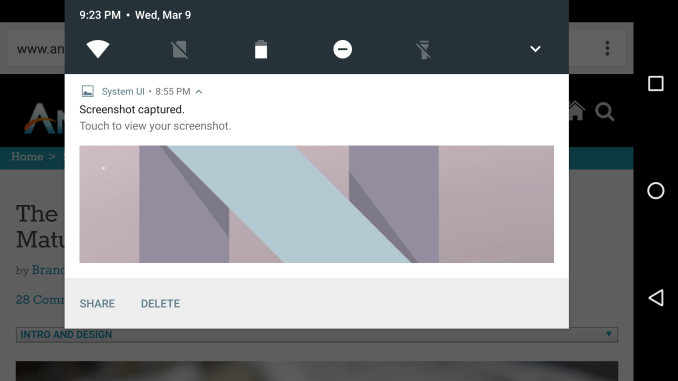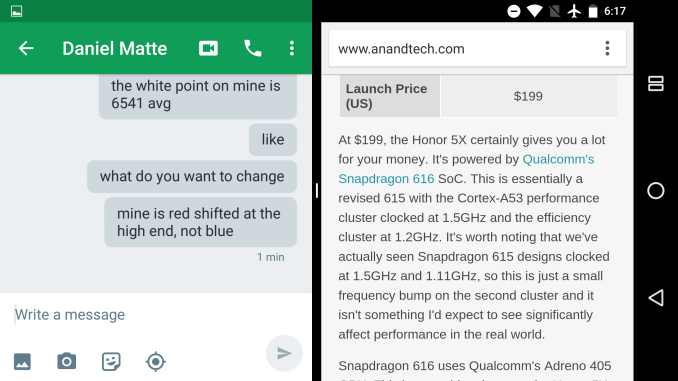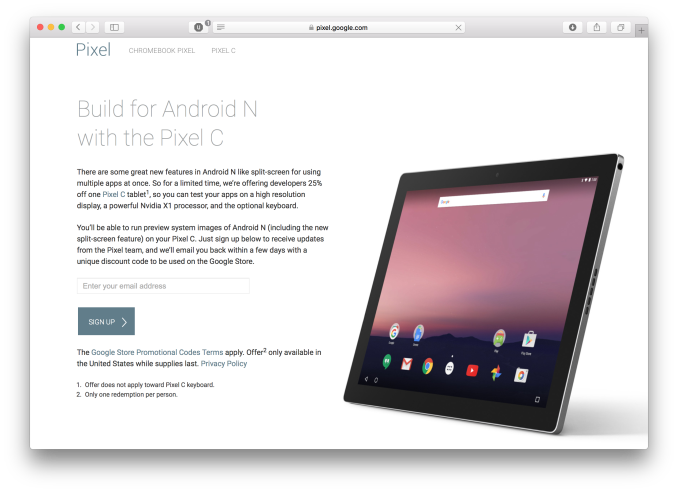Hands-On With the Android N Developer Beta: Multi-Window & More
by Brandon Chester on March 10, 2016 8:00 AM EST- Posted in
- Smartphones
- Android
- Mobile
- Tablets
Initial Impressions
Though I suspect it's not a popular opinion, I have long felt that the software design ecosystem for Android tablets has been stuck in a rut since the early days, and as a result users have struggled to find good, modern applications that really excel at the tablet experience. Android N can't magically bring proper tablet interfaces to all Android apps, but the Multi-Window support is a big help in improving the situation. With split windows in use, on a standard tablet you're really dealing with a screen segmented into two areas, and this is where a phone layout works pretty well. With that in mind, it does help to address the problems that Android tablets currently face, but I do hope that developers will continue to maintain existing tablet UIs, and that new developers will take the time to create ones. I don't know if Google's internal app development groups are prepared for this, but I have faith in the larger Android's developer community.
It's worth noting that the Multi-Window mode technically also works on phones. That said, unless you have a 6.8" phone (which is practically a tablet), I don't think the feature is very useful, but it's there. Even on the Nexus 6 there's just not enough screen space, and I would never use it myself. That said, while I was initially ttempted to recommend that Google just remove the feature on phones, on reflection it doesn't really hurt anyone to have it there for users that want it. On top of that, leaving it to tablets alone may cause some developers to just not support the feature entirely.
Google also has an advantage with Android apps already being designed to support many resolutions and aspect ratios. Several apps that I tried already worked with the split screen mode, and developers aren't going to have to rebuild their UIs like they did when Apple introduced split screen multitasking on iOS. In fact, it's most certainly the case that there are more apps that work with Android N's multitasking than there are that work with multitasking on the iPad, and considering that the feature just launched today in a beta OS I'd say that's a big win for Google and for Android.
If I were to make any recommendations for Google, it would be to make it a bit more obvious to the user that you can hold down the multitasking button inside an app to instantly get into split view mode. I happened to come across it because I figured that Google would have implemented some sort of quick access method, but it's not obvious enough for your average user. In addition, I think the current method of simply filling the view with the background color as you adjust the ratio between apps is not very aesthetically pleasing. These apps still aren't really designed to adjust their UI in real time, and although it's somewhat lame to just blur it out like Apple does on iOS, it looks better than watching the UI frantically try to fill the space.

Quick toggles are easier to access in Android N
As for Google's other changes, I think they're in line with what we've come to expect. After Lollipop, Google was able to step back and focus on the lower level problems with their platform, particularly regarding efficiency. The improvements to Doze will certainly have an impact on energy usage, and blocking apps from waking up in large numbers whenever the phone goes on or off of WiFi is a smart move. I expect that we'll see continued improvement of this sort in future Android releases, as problems with energy management are potentially the biggest problem plaguing the platform right now, with performance and usability having been mostly sorted out. These releases also provide a way for Google to make small improvements to areas like notifications and their built in applications to make the user experience a lot better through many little changes.
On that note, I'm sure many of our more technical readers are interested in being part of the beta. I'm very happy that Google has taken the necessary steps to make the process of enrolling in the program much easier for developers and users. Right now the supported devices include the Pixel C, Nexus 9, Nexus 5X, Nexus 6, Nexus 6P, and Nexus Player. To enroll your device in the beta you can visit this link and your device will quickly notify you that an update is available. It does need to be reiterated that this is a developer beta and a true beta at that - it's not a large-stage end-user beta - but I would encourage enthusiasts who do enroll to consider sending some feedback to Google about what they like and what could be improved, as that's ultimately what these beta programs are all about.
One last thing to note is Google's incentive for developers to test their apps on tablets so they can ensure proper Multi-Window support. For a limited time developers can sign up here to get a promo code which will knock 25% off the cost of the Google Pixel C. With Google recently having patched the most serious bugs on the Pixel C, for $375 it's a pretty good tablet and a very good device for doing application testing considering the fact that the Android N beta only works on two tablets. Interested developers can sign up here, and Google is seemingly taking people on faith that they really do intend to use the unit for development as it only involves entering your email address.
With Android N being in its early stages, I must say that I'm impressed with the stability and usability of the features that Google has added. With Google IO on the horizon we'll certainly be hearing more about what's coming in Android N, and I'm very excited about the direction Google is headed in.












124 Comments
View All Comments
UtilityMax - Saturday, March 12, 2016 - link
I haven't seen an Android ROM, including among generic AOSP-based ones, that did not have an option to turn the battery percentage on.zeeBomb - Thursday, March 10, 2016 - link
Very niceOmega215D - Thursday, March 10, 2016 - link
Hell, I think Google should address why their crap services keep causong wakelocks. A lot of it is the damn thing phoning home for bullcrap reasons and turning it off breaks a lot of Google apps and phone functionality. Android is becoming worse with each iteration.tuxRoller - Saturday, March 12, 2016 - link
Phoning home?Do you have a source for this claim which proves that "a lot" of the wakelocks address caused by "phoning home" (and, specifically, dealing with Google services without receiving any benefits like informing you of events/places nearby, weather updates, etc).
darkich - Thursday, March 10, 2016 - link
.. and just like that, Android becomes the most promising OS for tabletsmichael2k - Thursday, March 10, 2016 - link
Haha! You mean two years from now, when Android N hits 35% market penetration? Lollipop, in March, just finally beat KitKat (so a 2014 release has higher market share than a 2013 release) in 2016. While iOS 11 (with three years of multitasking and other enhancements) will hit 80% as well has having had multiple developers releasing multiple updates to support all those enhancements? I agree Android is promising, but they have to contend with two dominant powerhouses, Apple and Microsoft, in the tablet space. Apple gets to ride on iPhone sales and Microsoft gets a ride on PC sales.haukionkannel - Thursday, March 10, 2016 - link
Yep, that is still the problem... The os upgrades to Android devices are scarce and come late.Not Googles fault, but the problem is also guite severe to them. The apps are made for those very old versions of os, because most Android devices use those versions, so Android apps will be behind iOs and Windows apps in that aspect.
raptormissle - Thursday, March 10, 2016 - link
You clearly do not understand how Android apps are developed. To imply that Android apps are made for "those very old versions of os" was a very silly comment. Most features in the new SDK are backported to previous versions via the app compatibility libraries. Do some research next time.As for windows apps...well that is so hilarious I'm not even going to go there.
raptormissle - Thursday, March 10, 2016 - link
>but they have to contend with two dominant powerhouses, Apple and Microsoft, in the tablet space.LOL, did you just say Windows was a dominant powerhouse in the tablet space? LOL You were joking right? Windows tablets are right down there with windows phones.
michael2k - Thursday, March 10, 2016 - link
You're ignoring PCs, which currently still dwarf tablets about 5:1 (45m to 246m in 2015). Gartner also lists Microsoft in the top 5, behind Samsung, Apple, Lenovo, and Huawei (in that order) in the tablet space. So, no, actually, not a joke. Microsoft is always free to screw up, though.